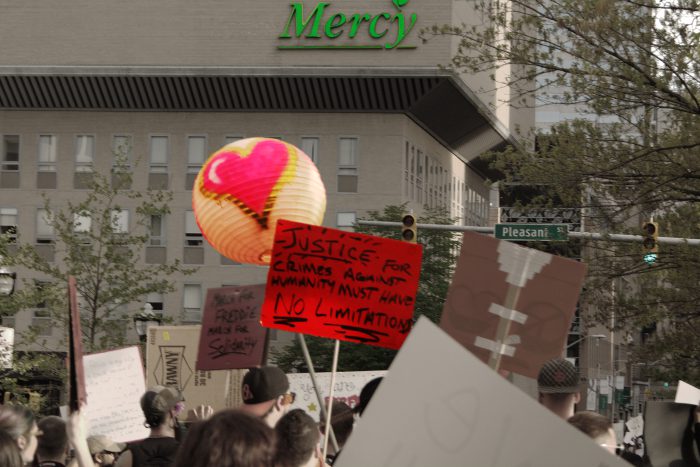(Update: at editor request, I’m anonymizing the critic to whom I am responding. They have been renamed “John Doe” for purposes of this post.)
This is a summary of my detailed reply to a list of questions from John Doe. Since John took the time to summarize the controversy I thought he deserved a detailed response, but unless you’re really interested in the gory details of this blogfight, or you really like my writing style when I ramble, you should probably read this post instead of that. This post serves as a summary of not just my reply to John but of the whole controversy of the past week.
Even this summary is long, 2,900 words! You might read just the first part, “The Thesis”.
(A side note: I don’t usually do this, but since my personal reputation is being sullied by baseless accusations I’m going to explicitly ask that if you find merit in this post, you share it on the social media platform of your choice.)
I do thank John for giving me a clear set of points to address, for effectively summarizing the controversy. But it’s clear that he and I differ on core values — he started his note by rejecting the idea of free speech, a value for which I might be willing to give my life.
He and I are unlikely to find rapprochement, and at best might come to regard each other as worthy adversaries. I think we both identify with the political “left” as we understand it, but his is apparently an authoritarian left and mine a libertarian left. (A small-l libertarian, as in “civil libertarian”, not related to the sophomoric “Libertarian Party” in the U.S.)
The Thesis
Last week I posted a piece with the provocative title “There Is No Such Thing as ‘Cultural Appropriation'”. It has caused a bit of a stir, to say the least. Some people may have misunderstood my point, and I regret any failures of craft in my writing that led to that. On the other hand, plenty of people seem to have grasped it immediately: rather than a questionable concept like cultural appropriation, we ought to use specific terms like misrepresentation, plagiarism, and insult when we discuss the problems involved in copying ideas from other cultures.
I certainly would have moderated the title of that original piece a bit if I’d known how many people would, apparently, read only the title and not the piece itself! Maybe something like “Deconstructing Cultural Appropriation”. (At least I didn’t go with my first thought for a title: “When I Hear the Word ‘Cultural Appropriation’, I Reach For My Revolver.” That little joke would not have gone over well at all.)
I attempted to provide some additional context, and also to castigate some extreme or ignorant commenters — and also vent a little steam and express my head-shaking and face-palming wonderment and bemusement at the whole thing — in a second post.
So what’s the actual point in dispute? Here’s a useful definition of “cultural appropriation”, quoted in Bruce Ziff and Pratima V. Rao’s Borrowed Power: Essays on Cultural Appropriation: “the taking — from a culture that is not one’s own — of intellectual property, cultural expressions or artifacts, history and ways of knowing”.
But “intellectual property” is viewed by many as a null concept. That’s a common argument in the tech and free-culture worlds, and was the whole launching point for my thesis. If you’re unfamiliar with that argument I suggest you read the linked essay by Richard M. Stallman, since my inspiration was spotting a parallelism in how both “intellectual property” and “cultural appropriation” were made up of several distinct phenomena glued together for political purposes — a process which actually obscures the underlying issues.
We don’t need a new word to describe taking physical artifacts that belong to someone else, “theft” is quite sufficient. And the idea that one can “take” history or ways of knowing away from someone else is at best very questionable; if I learn the history of a different culture, it does not prevent a member of that culture from knowing that same information.
So this definition of cultural appropriation illustrates the hodge-podge of problematic concepts in play. I am far from the first person to offer a criticism of the idea! In fact, even as they seek to explore it, Ziff and Rao note “This simple description bristles with uncertainty.”
My point is this: precise and accurate language is necessary for political or philosophical progress. By confusing culture — a set of ideas — with property, the term “cultural appropriation” is not accurate. By displacing more specific terms like “misrepresentation” or “plagiarism”, it is not precise.
As the term is usually used it lumps together petty claims of emotional upset about the legitimate personal choices of other people, things like hairstyles and musical tastes, with actual crimes committed against oppressed cultures by imperialist assholes. Using this concept obfuscates things.
The Controversy
The right to question
Some commenters have been critical of not just this thesis (which can certainly be legitimately debated) but of the very act of questioning a sacred cow of the so-called “social justice” movement. As John Doe put it, “Why do you feel you have the right to redefine what Cultural Appropriation is from noted scholars and marginalized and oppressed people?” He claims that this “de-validates the entire foundation of a movement in the process and the work being done”.
I believe we need to actually examine ideas themselves, that anyone has the right to challenge an idea and to have their arguments assessed through critical inquiry, not on status or authority. Yes, I will sometimes fall short of this aspiration (you might even catch me doing so here!), and there are practical limitations because we can’t hear everyone at once. We certainly need to do a better job of making sure people from marginalized cultures — and we need to include not just race and religion but class there — have the ability to hear their arguments heard! But my goal when doing philosophy or politics is equality for all before the processes of logic.
Now, with that comes the responsibility of everyone to make reasoned arguments, and not to claim to be exempt because of status — either high status or low status. Whether you are rich and powerful or marginalized and oppressed, if you make a bad argument it is still a bad argument. (Again, yes, I will sometimes fail to put this into practice.)
In short: I have the right to question the definitions and theories put forward by others because I am a human being, and all humans have that right, regardless of their status or the status of the one proposing the theory.
Diversity of opinion
There seems to be in John’s questions and charges, and in similar comments from others, a blankness regarding the fact that people have a diversity of opinion about these things. It seems as if some of these folks are almost shocked to encounter someone not in lockstep, and assume they must be evil.
He asks if I considered the effect on “colleagues/peers and the social implication of this, colleagues who not only share blog space with you, but are also fellow writers with you in other platforms.” It seems odd to me that he’s got no problem sharing a site or a publisher with people with radically different views about religion, that he finds it okay to share a site with Bristol Palin, but finds it ruinous if someone disagrees with him about how to think about and discuss the problems of racism and oppression.
I think these folks have spent too much time in an echo chamber. I don’t think they realize that outside of the “social justice” blogosphere and the softer parts of academia, the term cultural appropriation is often something used ironically, with a shake of the head.
And I don’t mean by reactionary conservatives, I mean by people with a genuine concern for justice and equality. I mean by people who understand and are ready to work against things like police violence and mass incarceration, the systemic racism in the “criminal justice” system (scare quotes intentional), voter ID law shenanigans that would make Nixon’s dirty tricks squad blush, the grinding poverty on Native American reservations, the way in which tribal governments have been cheated by the federal government…I could go on, there is certainly no shortage of real problems with a racial component.
But what these people see from this movement is bloggers shaking their finger at white people over personal choices that are irrelevant or at best minor sins. Yes, some of those real problems are cultural or have cultural roots, but yelling at a hippie over their hairstyle is not going to fix them.

Towards a real social justice movement
Let me be clear — I want a movement that will help free the oppressed, lift up the downtrodden, and let all sentient beings live to their limits.
I don’t claim to be much of an activist, but I’ve gotten up from my comfy chair a few times. I demonstrated against Gulf Wars I and II, I risked arrest at Occupy Baltimore the night the police-announced deadline ran out, I broke federal law and engaged in civil disobedience when they passed the “Communications Decency Act” in 1996, and this spring I marched for justice for Freddie Gray and other victims of police violence in front of the machine-gun-toting troops occupying Baltimore.
I’m sure as hell not in the vanguard. I know too many real activists to confuse these little actions with the real thing! But I am ready for a movement that will inspire America to be angelic, and I’d be willing to take a bit of risk for one, to do more than click and retweet, to get up on my feet.
But what John and his cohort represent, isn’t that movement.
If anything, it gets in the way of such a real movement. It’s not just the questionable theories like “cultural appropriation”, it’s the way in which the sort of outrage storm we’re seeing here degrades communication.
People are not joining because they don’t want to be subjected to this sort of treatment. I know that at least two Patheos Pagan writers found at least some iota of merit in my argument, but canceled posts they were planning for fear of fanning the outrage. Making people keep silent out of fear of being yelled at is a poor recruiting tactic.
In short: John, in my humble opinion, you’re not helping.
Dismissing
In the original piece I called for the rebuke of misrepresentation, plagiarism, and insult directed at non-dominant cultures. I took swipes at imperialism, slavery, and people who think Confederate flags are cool. Yet somehow, John reads into that “dismiss[ing] the marginalized population.”
Now, sometimes a specific complaint may be dismissed. In criminal law we don’t simply accept an accuser’s complaint that they’ve been a victim of a crime — we don’t let a complainant determine if a crime has been committed and its nature and its punishment and the guilt of the accused. Rather, we have a system of laws and courts (however deeply, deeply flawed!) to assess the complaint. We do this because we care about the accused as well as the complainant. We understand that convicting an innocent person is a horrible thing.
Just so, we shouldn’t simply accept the complaint of someone saying they are a victim of a “social crime”, if you will: we should hear their complaint but carefully consider what constitutes such a crime and whether the accused in any given case is guilty. And sometimes that means the complaint will be judged not valid.
We need to understand that while someone may genuinely and honestly feel offended, that does not mean that an actual offense has been committed against them. That applies to, for example, religious conservatives who feel offended by gay marriage; it also applies to, for example, an African-American who feels offended by a white guy playing a Leadbelly tune.
And that’s not dismissing a person or a population. That is due process. I hope that’s a value everyone shares — though I do find some on the authoritarian left to be willing to jettison it, and that’s scary.
Confused and Contemptible Charges
There are many legitimate arguments that could be raised against what I’ve written. If John wants to say that what I’ve written is unclear and could be twisted by “white power” dingbats, or has factual errors about racism, or is poorly reasoned, or is insufficiently critical of the roots of oppression, okay, we could have a legitimate — if heated — debate about that. But throwing about charges of racism, and using phrases like “white power thesis” to describe my post is, to be blunt, shockingly contemptible.
It seems as if he’s confused “You said something about racism that (I think) is wrong” with “You are racist”. That’s a very serious confusion and I urge him to resolve it.
Twisted Language and “Damage”
John and others have made the strange claim that my post “damaged” people. A core issue here is this twisted use of language. I didn’t punch anyone in the nose. I did not defraud or defame anyone. I attacked an idea. (Though it’s true that I have since then attacked extreme and ignorant commenters — but not specifically by name, only by the ideas that they hold.)
This is about a blog post by somebody (yours truly) that almost nobody had heard of before all this, and who will fade back into obscurity when the outrage machine moves on. “Injured” doesn’t come anywhere near what’s happened here.
It seems some people are conflating “injured” with “upset”. Yes, a number of people read the article and became upset, that’s certainly true! Some of them misunderstood what I intended to say; as with any such misunderstanding, some of it is due to what readers bring, but some is due to poor craft on my part, and I genuinely regret that.
Others are upset because they understood it but disagree with it. But there is a hell of a difference between “I read something I disagree with and it upset me” and “I have been injured.” It is very problematic and disturbing that some people seem bent on erasing this distinction. (Cf. the whole “trigger warning” discussion.)
The Goal
In the original post I explicitly called for people to “speak out against [intellectual laziness, dishonesty, and plagarism in dealing with ideas from cultures other than our own], encourage [their] friends to avoid the mild versions of such failures and roundly castigate social and political leaders who commit serious versions of them” and very plainly stated that those failings are “not ok…not cool.” Anyone who thinks my goal was to defend or justify oppression just did not read accurately.
If my post fulfills its intent, if it leads to clearer thinking and better discussion of misrepresentation, plagiarism, and insult, then we all will benefit as those behaviors decrease — and people who are not actually doing anything wrong are not inaccurately accused of social crimes. I would expect that any such success would be marginal, of course; it would depend on someone much more influential than I picking up the idea.
I’d love to get rid of hate and racism. I’m trying to do that the best I know how, by promoting clear thinking and clear communication, by saying that we need to kick unhelpful concepts to the curb, by calling on people to denounce actual instances of them.
I think the ideas that people like John are promoting don’t help solve the problem and actually might make it worse. They think the ideas I’m promoting don’t help solve the problem and actually might make it worse.
And so we find ourselves in disagreement about most everything relevant to this conversation.
These posts (this one and the summary) plus the original and my first reply will make about 10,000 words from me on the topic over the past week or so. So I think I’ve taken up enough of the air in the room for now. Rather than continue to repeat the same points over and over, once these are up I don’t plan to make any further public comment on the subject for at least the next two weeks.
I do hope that this controversy might inspire useful dialogue about how we can respect other cultures, deal with racial injustice, and promote the rights of all people; how we can build a genuinely inclusive and inviting movement for social justice and liberation, rather than a machine for personal criticism. Part of the reason I’m going to step back for a moment is to make space for that dialogue happen, rather than feeding that personal criticism machine — be it targeted at me, or at John Doe. Let’s yell at each other about ideas, not about people.
I’ve done what my Great and Good Lady Eris Discordia requires of me, and thrown the Golden Apple into the room; it’s up to the rest of the folks who care about this to decide who is the prettiest one.
Maybe I’ll move on to a nice safe topic. Like gun rights.
You can keep up with “The Zen Pagan” by subscribing via RSS or e-mail.
If you do Facebook, you might choose to join a group on “Zen Paganism” I’ve set up there. And don’t forget to “like” Patheos Pagan and/or The Zen Pagan over there,
too.

















